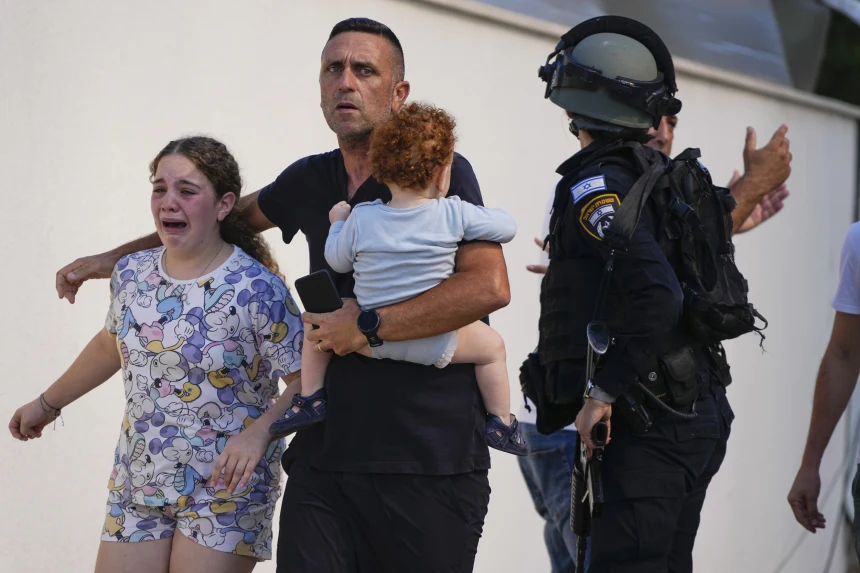‘We are in a war,’ Netanyahu says after Palestinian militants launch surprise attack

Israeli police evacuate a family in Ashkelon after it was hit by rockets fired from the Gaza strip. Photo: Tsafrir Abayov / AP
ASHKELON, Israel — Palestinian militants launched a deadly land, air and sea attack inside Israel on Saturday, with fighters infiltrating the country’s south and firing a massive barrage of rockets from the Gaza Strip.
Israeli Prime Minister Benjamin Netanyahu responded to the unprecedented incursion in a video on social media: “We are in a war,” he declared, “not an operation, in a war.” He ordered strikes on Gaza and called for an “extensive reserve mobilization.”
At least 40 people have been killed, a spokesperson for the Israeli rescue service Magen David Adom said in a statement. The service has provided care to “hundreds” of injured individuals, from moderate to serious, it said, adding that helicopters, mobile ICUs and bullet-proof ambulances have been mobilized.
Graphic but unverified video and photos shared on social media suggested that toll could rise sharply.
Six Palestinians were killed in shelling and gunfire in Gaza, the Palestinian news agency WAFA reported.
Militant group Hamas, which rules Gaza, said it was behind the operation it dubbed “Al-Aqsa Flood,” which marked a major accomplishment for the group — and escalation.
“Enough is enough,” the elusive leader of the group’s military wing, Mohammed Deif, said in a recorded message that called on Palestinians to join the fight.
“This is the day of the greatest battle end the last occupation on earth,” he said, adding that 5,000 rockets had been launched.
NBC News was not able to independently verify this claim.
As volunteer recruitment and an effort to arm all police forces got underway, Itamar Ben-Gvir, Israel’s security minister, declared a state of civil emergency giving police additional powers to carry out raids and arrests.
Across Israel’s Route 3, a highway 15 miles north of Gaza, police armed with assault rifles fanned out across roads, checking cars for gunmen trying to pass further into the country.
Highways across the country also emptied out except for emergency vehicles, as security forces erected checkpoints for passing traffic.
In Tel Aviv, residents rushed to hospitals and medical offices to donate blood for the injured, as the city’s leaders ordered bomb shelters be opened.
The violence follows weeks of heightened tensions along Israel’s volatile border with Gaza, and heavy fighting in the Israeli-occupied West Bank — but also years of unresolved grievances over the treatment of Palestinians that have long threatened to erupt.
The Israeli military confirmed an infiltration had occurred in several locations near the Gaza barrier in southern Israel. It ordered residents to remain indoors.
Israel has built a massive fence along the Gaza border meant to prevent infiltrations. It goes deep underground and is equipped with cameras, high-tech sensors and sensitive listening technology.
Israel and Egypt imposed a blockade over Gaza after Hamas seized control of the territory in 2007. There have been four wars since then, most recently in 2021. There have also been numerous rounds of fighting between Israel and Hamas and other smaller militant groups based in Gaza.
The blockade, which restricts the movement of people and goods in and out of Gaza, has devastated the territory’s economy. Israel says it is needed to keep militant groups from building up their arsenals, while the Palestinians say it amounts to collective punishment.
Saturday’s stunning developments come at a crucial moment, as it pursues what would be a landmark deal to normalize relations with Saudi Arabia that is being brokered by the United States.
Any new outbreak of fighting is likely to strain that process.
The assault also comes during a period of heavy fighting in the West Bank, where nearly 200 Palestinians have been killed in Israeli military raids this year, according to U.N. Mideast Envoy Tor Wennesland. Israel says the raids are aimed at militants, but stone-throwing protesters and people uninvolved in the violence have also been killed.
Palestinian attacks on Israeli targets have killed over 30 people so far in 2023, Wennesland said in an August briefing to the U.N. Security Council.
The surprise Palestinian offensive comes 50 years since Israel’s Arab neighbors launched a coordinated surprise attack that began the 1973 Arab-Israeli war.
Raf Sanchez reported from Ashkelon, Israel. Max Burman reported from London.
For more live updates, click here.